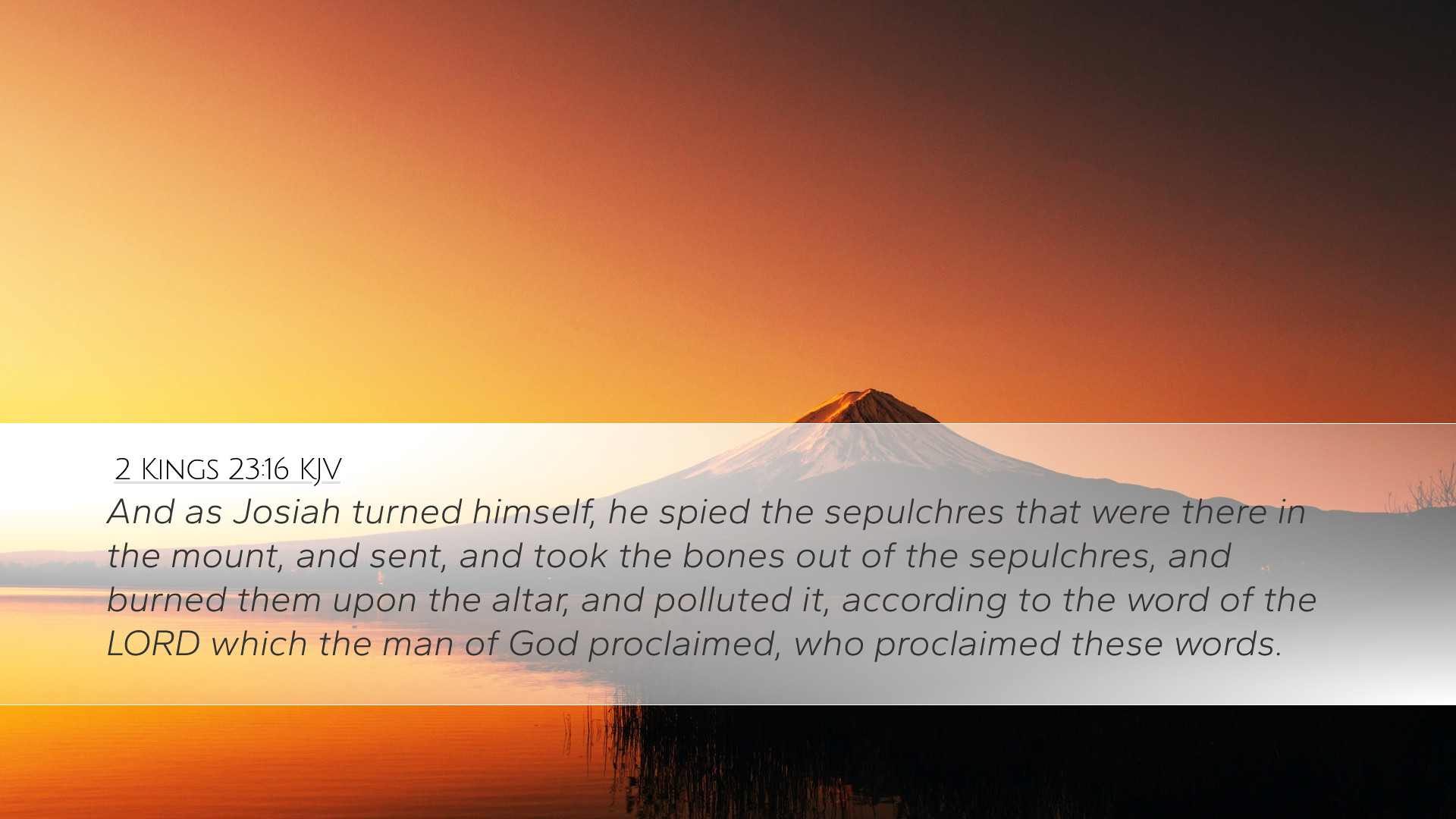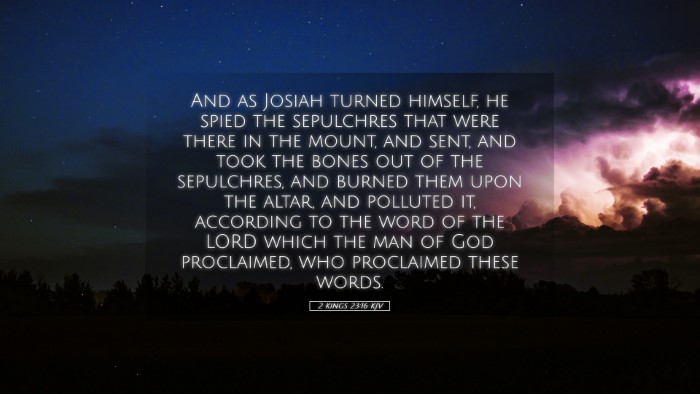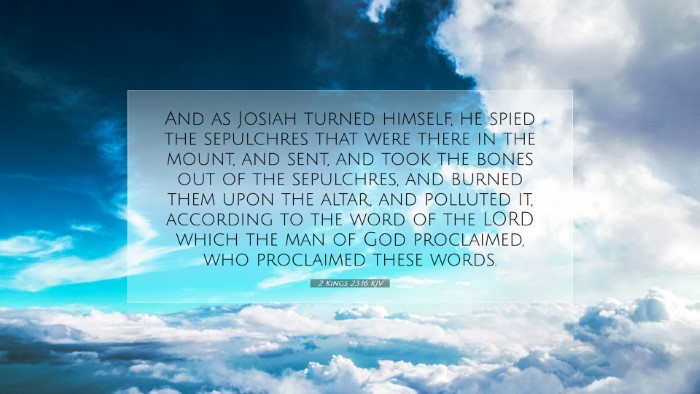Commentary on 2 Kings 23:16
Verse: "And when Josiah turned himself, he spied the sepulchres that were there in the mount, and sent, and took the bones out of the sepulchres, and burned them upon the altar, and polluted it, according to the word of the LORD which the man of God proclaimed, who proclaimed these words." (2 Kings 23:16, KJV)
Introduction
This passage from 2 Kings 23:16 marks a significant moment in the reign of King Josiah, highlighting his reforms and dedication to restoring true worship in Israel. This commentary explores various aspects of this verse, drawing insights from public domain commentaries by Matthew Henry, Albert Barnes, and Adam Clarke.
Context of the Reforms
Josiah became king at the age of eight and grew to be one of Judah’s greatest kings. His reign is characterized by serious reforms aimed at returning the nation to the worship of Yahweh. This action, taken in 2 Kings 23:16, must be understood within the broader context of his religious reformation.
Historical Background
- Ascendancy of Josiah: Josiah's rise comes after a tumultuous period of idolatry and disobedience in Israel. This was a time when the worship of Baal and Asherah had infiltrated Judean society.
- The Role of the Law: The discovery of the Book of the Law (possibly Deuteronomy) during renovations of the temple ignited Josiah's zeal for reform.
- Divine Judgment: The reforms included abolishing improper worship and adhering strictly to the commands found in the law, believing Israel’s previous idolatry had invited divine judgment.
Verse Analysis
In this verse, Josiah's discovery and deliberate action reflect both prophetic fulfillment and deep personal conviction.
Josiah's Action
- Turning Himself: Josiah's attentiveness signifies his leadership and openness to divine guidance. His physical turning can symbolize a spiritual redirection of the nation.
- Spying the Sepulchres: The sepulchres represent relics of idolatry and are linked to the corruption Josiah sought to eradicate. The fact that he "spied" indicates an active engagement rather than passive observation.
- Taking the Bones: The act of taking bones indicates a thorough and direct confrontation with the idols of the past. This reflects a radical reformation, not simply a superficial change.
- Burning the Bones: Burning serves as a sign of judgment, symbolizing the total rejection of past idolatrous practices as per the prophetic proclamation from earlier eras (see 1 Kings 13:2).
- Polluting the Altar: This act is profoundly symbolic, illustrating how righteousness can uproot and cleanse what has been defiled. It demonstrates Josiah's resolve to alter the spiritual landscape.
Interpretations from Commentaries
Matthew Henry's Commentary
Matthew Henry emphasizes the gravity of Josiah’s actions as a demonstration of zealous obedience to God’s commands. He illustrates that Josiah's severe steps were not impulsive but a response to a direct revelation of God’s displeasure with idolatry. Henry takes note of how significant it is that Josiah aligns himself under prophetic authority, interpreting this act of renunciation of the past in light of God’s future intentions for His people.
Albert Barnes' Notes
Albert Barnes also reflects on the importance of Josiah's actions in fulfilling prophecy. He highlights that the bones Josiah burned were remnants of those who practiced idolatry, showing that such practices lead not just to personal but communal consequences. Barnes points out that the act of burning demonstrates a public declaration against idolatry, echoing themes of cleansing and sanctification within Israel's worship.
Adam Clarke's Commentary
Adam Clarke provides a theological perspective, describing the transformative nature of Josiah’s actions. Clarke interprets the burning of the bones as a powerful message to the people regarding the consequences of unfaithfulness to God’s covenant. He explains how Josiah's actions speak to the necessity of purity in worship, noting the prophetic significance attached to this act as an effort to restore the holy ground of the altar.
Theological Implications
This verse opens avenues for rich theological reflection:
- Divine Sovereignty: The events remind us of God's overarching sovereignty in directing history and leading His people back to Himself through chosen leaders.
- The Call to Righteousness: Josiah's example calls today’s believers to distinguish themselves from cultural idols and to purify their worship, making it a significant communal and personal act.
- Prophetic Fulfillment: The connection to earlier prophecies reinforces the consistencies in divine revelation across generations, reminding practitioners of the importance of biblical prophecy in their understanding of God’s work.
Conclusion
2 Kings 23:16 serves as a compelling narrative of reform and dedication to true worship. Josiah represents a model leader who operates not merely on political or social fronts but fundamentally engages with spiritual realities seeking transformation in the lives of the people. The insights from public domain commentaries collectively emphasize the need for deep conviction in leadership that realizes the worship practices relevant to the covenant relationship with God. For pastors, students, theologians, and scholars, this passage reminds us of the necessity to confront idolatry in our own contexts, purify our practices and return wholeheartedly to the worship of the one true God.


